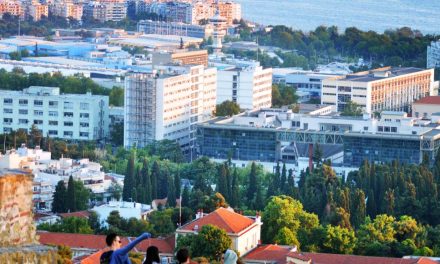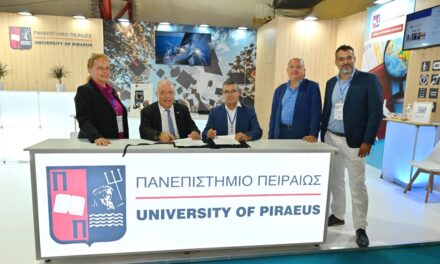COPE-Nano is a flagship Horizon Europe Project that will leverage on the internationally acknowledged track record and innovation activities of the Nanotechnology Lab LTFN at the Aristotle University of Thessaloniki in order to establish a new, autonomous and sustainable Centre of Excellence for Organic, Printed Electronics & Nanotechnologies in the city of Thessaloniki.
COPE-Nano aims to become a leader of European and international research and innovation at the rapidly evolving fields of Organic Electronics, Nanomedicine and Nanotechnology – that have applications in Green Energy, Electronics, Information and Communication Technologies, Medicine and Agriculture. It is the first EU funded Center of Excellence in Greece and the first in Europe that is focused in Nanotechnologies and Organic Electronics. The Centre aims to will strongly enhance the scientific and technological capacity of Greece, raising the research profile of Greek and EU scientists, researchers and entrepreneurs.

The establishment of COPE-Nano Centre of Excellence is supported by the European Commission and the Greek Government (General Secretariat for Research & Innovation) with a total budget of 30 million Euros. The project is coordinated by the Nanotechnology Lab LTFN at the Aristotle University of Thessaloniki, with participating institutions of international excellence, including the University of Cambridge, UK, and the ADERA/University of Bordeaux, France. Moreover, it brings together a strong global network of more than 30 international academic, research and industrial organizations which have expressed their intent for collaboration and synergies with COPE-Nano.
Speaking at the Official kick-off Ceremony for the COPE-Nano Project on May 30th, former meputy minister for the Interior, Stavros Kalafatis, noted that “the establishment of the European Research Center of Excellence COPE-Nano is a great Greek achievement, with ambitions to play a leading role at the national, European and international level in the rapidly developing fields of Nanotechnology. The Centre integrates and develops all the know-how acquired over the years by the LTFN Nanotechnology Laboratory of the Aristotle University of Thessaloniki. The city of Thessaloniki – where the 3rd generation photovoltaic production unit is also being built – is becoming a point of reference in the field of Nanotechnology”.
Kalafatis emphsized that already in Thessaloniki “technologies are being developed with the aid of European programs and the decisive contribution of the scientists and researchers of the Aristotle University. At the same time, the city is an investment point for companies. Giants of innovation such as Cisco, Pfizer, Deloitte, Deutsche Telekom, Accenture are developing in the Thessaloniki ecosystem, and more are coming”. COPE-Nano is projected to create jobs for 400 scientists and researchers and it is the first Centre of Excellence to be created in Greece within the framework of Horizon Europe.
Scientific manager of COPE-Nano project and director and founder LTFN, Professor Emeritus Stergios Logothetidis announced that COPE-Nano will have 5 Institutes linked to advanced materials, technologies, energy and the creation of Nanosystems. The synergies between these new innovation bodies and existing ones have as a result that as, as professor Logothetidis notes “the nanotechnology ecosystem that is being developed in Thessaloniki is unique in Europe”.
Scientific manager of COPE-Nano project and director and founder LTFN, Professor Emeritus Stergios Logothetidis announced that COPE-Nano will have 5 Institutes linked to advanced materials, technologies, energy and the creation of Nanosystems. The synergies between these new innovation bodies and existing ones have as a result that as, as professor Logothetidis notes “the nanotechnology ecosystem that is being developed in Thessaloniki is unique in Europe”.
The Lab for Thin Films – Nanobiomaterials – Nanosystems & Nanometrology (LTFN) at the Aristotle University of Thessaloniki is an internationally acknowledged research lab, specializing in Organic Electronics, Thin Films and Nanomaterials Technology (vacuum, printing), Nanomedicine, Nanometrology, Real-time/In-line precision Metrology, Automation and Digital Manufacturing. LTFN has also established the Center of Organic & Printed Electronics – Hellas (COPE-H) for cutting-edge Research and Manufacturing of Organic Electronics Devices for applications in Energy, Displays, Lighting, Electronics, Automotive, NanoBiomedicine, Smart Textiles and Wearables, IoT devices, Smart Food Packaging, Greenhouses, etc.
What is more, LTFN coordinates many EU/National R&D Projects, founded the Hellenic Organic & Printed Electronics Association (HOPE-A) , the Research & Innovation Netwrok Nano|Net, the Post-Graduate Program on Nanosciences and Nanotechnologies-NN, and organizes annually the internationally established NANOTEXNOLOGY, a multi-even combining International Conferences, Summer Schools and Exhibitions on Nanotechnology, Organic Electronics and Nanomedicine.
LTFN boasts a Lab space area of 2000 m2, including clean room facilities of 600 m2 and state-of-the-art equipment and facilities, 10 Pilot Lines and several TestBed facilities, combined with strong activity in R&D Projects and dynamic collaborations with SMEs, industry and academia. LTFN is a Digital Innovation Hub, offering open access to interested entities (Academia, Research, SMEs, Industries), while serving as an One-Stop-Shop for SMEs for technology transfer, proof-of-concept and incubation.
I.L.

TAGS: BUSINESS & TRADE | RESEARCH













